ALERT – NYU Grad Student Union BDS Vote Mid-April
Deceptive tactics, and another attempted hijacking of unrelated causes.
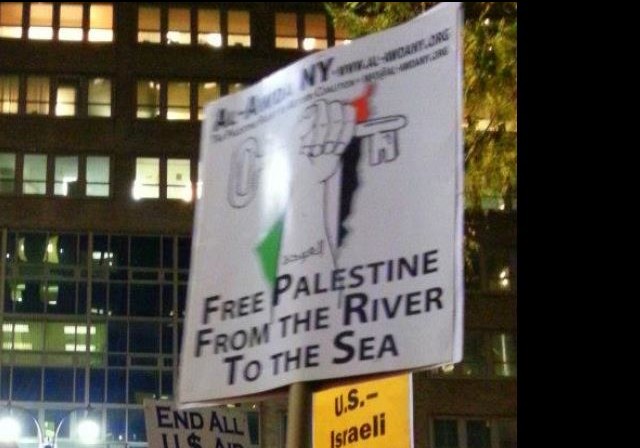
We reported previously on the deceptive anti-Israel Boycotts, Divestment and Sanctions (BDS) campaign at NYU, in which BDS supporters try to co-opt unrelated divestment movements, such as fossil fuel.
This campaign has now morphed into a boycott petition at NYU’s Graduate Student Union (GSOC-UAW Local 2110). Meanwhile the deceptive tactics continue.
This episode illustrates, yet again, the strategy of pro-Palestinian activists in taking over student governments and other associations and hijacking them for their own agenda.
If all goes according to plan, there will be a referendum on a Boycott and Divestment petition that includes a call for Academic Boycott and a call to shut down NYU-Tel Aviv). The referendum, open to all union members, is tentatively scheduled for April 18-22.
We cover below the following:
I. Some background on anti-Israel activity at NYU
II. Background on SJP’s Divestment campaign at NYU
III. Background on BDS at the University of California’s union last year
IV. Background on NYU’s new radicalized union.
V. Discussion of the petition itself (including (a) the process; (b) campaigns and (c) the substance of the actual resolution)
VI. The opposition campaign and counter-petition (which NYU faculty, students, and alumni can still sign)
VII. Conclusion
I. Background on anti-Israel “pro”-Palestinian activity at NYU
Students for Justice in Palestine (SJP), a national organization with dozens of campus chapters, has been subject to numerous posts here, due to its highly aggressive, often anti-Semitic tactics (such as when Vassar SJP spread a Nazi cartoon or when it referred to the “Zionist Administration” at CUNY, claiming that tuition hikes on minority students was tied to investment in Israel).
In the early morning hours of April 24 2014, SJP members slipped fake eviction notices under the doors of over 2000 students living in two student residence halls at NYU:
The notices ordered the students to leave their dorm rooms, declaring that their suites were “scheduled for demolition within three days”.
In May 2014, SJP members staged a “die-in” protest on the NYU campus with the stated goal of “calling attention to Israel’s ongoing project of ethnic cleaning in the occupied Palestinian territories.” The group called for the destruction for the State of Israel, chanting “tear it down, occupation, tear it down, Zionist state!”
SJP activism was particularly extreme at the Law School. One of the leaders of SJP wrote a bizarre piece attacking the anti-Israel, pro-BDS, “Jewish Voices for Peace” (JVP), for distancing themselves from anti-semitic crackpot Alison Weir, accusing JVP of “ethnic chauvinism”.
Meanwhile, at the Law School, SJP students were behind a histrionic campaign and protest when IDF attorney (and NYU alumn) Dr. Eran Shamir-Borer spoke at NYU (the protest included a, by now de rigueur, “die-in”), resorting to their usual tactic of silencing a speaker they disagree with by demanding his invitation to speak be rescinded, and when that fails in attempting to block access to the room. It is remarkable how un-self-aware SJP advocates are on this issue: on the one hand protesting the mere presence of a speaker or disrupting him and on the other complaining they are silenced even when they are allowed to speak (as they did when a major law firm chose not to fund events sponsored by SJP at Harvard with its own money).
SJP also staged a petition and campaign against former legal adviser to the State Department and former Yale Law School dean, Harold Koh, who visited NYU Law School, teaching a class in international human rights law.
Not to be outdone or accused of harboring animus to Obama administration officials exclusively, the same group , together with the indefatigably irascible National Lawyers Guild, protested the presence of Bush Administration Attorney General, Judge Michael Mukasey at NYU Law this fall, calling him, too, a “war criminal” and “conspiracy theorist”, all while apologizing for real war criminals and terrorists, alleging conspiracy theories of their own:
Millions of people around the world, particularly people of color — from Palestinians under blockade in Gaza and in military jails in the West Bank, to “suspected terrorists” in Guantanamo Bay, CIA military prisons in Afghanistan, or lawless extradition programs, to black and brown people in the United States who face the perpetual threat of police violence, to migrants who have been summarily rejected from the country fleeing civil war — are disproportionately detained, exiled, jailed, killed, or tortured, their mere existence reduced to a crime…
Meanwhile, in April 2015, SJP hosted an event called “Israeli Racism and Apartheid: An Insider’s View”, featuring Israeli Arab Knesset Member Haneen Zoabi (Joint List), who participated in the 201o Mavi Marmara”Flotilla” to Gaza, in which “activists” scuttled IDF soldiers with clubs, and has been investigated for inciting violence on a number of occasions. Zoabi was suspended from the Knesset in July 2014 after defending the Hamas terrorists who kidnapped three Israeli teenagers (later found to have been executed by Hamas), declaring that the abductors were “not terrorists.” Zoabi is currently under criminal investigation after calling for “real intifada”.
And while Zoabi’s right to speak was respected, Israel’s Ambassador to the UN’s right was deemed less valuable, as SJP protested his speeking at NYU’s Mock United Nations meeting (why attempt? Because the Ambassador didn’t show, but SJP protested his replacement speaker instead).
The law school contingent is busy at work as well, why just this week they’re organizing an event on the ‘right of return’ and its “centrality” to a “holistic” resolution of the conflict, in case anybody might think they’re still interested in peace, the existence of Israel, or a two-state solution.
II. SJP’s NYU Divestment Campaign (a tale of at least 4 petitions, disguised as 1)
SJP staged a divestment campaign as well. The campaign was deceptively framed as a petition to divest from “Palestine, Fossil Fuels, and Labor”, piggybacking on a much larger ongoing petition at NYU to divest from fossil fuels, which was subsequently shot down by the faculty.
The trickery is typical of SJP organizing: organize a campaign that already has some popularity in left-wing activist circles and then addend BDS as an integral part of that same, unconnected campaign. For example, at CUNY this year, two initiatives followed this pattern. In October, a petition to divest from private prisons smuggled in, at the very end of the letter a demand divest:
from Israeli companies as well as the divestment from organizations that fund the existence of apartheid Israel
(note the term “existence”)
Additionally, as covered here before, CUNY SJP hijaked the “million students march” in November linking tuition hikes to the Israel and CUNY’s “Zionist administration”:
On November 12th, students all across CUNY will rally to demand a freeze on tuition and new contracts! We must fight for funding for our university, and for CUNY to be accessible to working class communities in NYC as the public university system. The Zionist administration invests in Israeli companies, companies that support the Israeli occupation, hosts birthright programs and study abroad programs in occupied Palestine, and reproduces settler-colonial ideology throughout CUNY through Zionist content of education. While CUNY aims to produce the next generation of professional Zionists, SJP aims to change the university to fight for all peoples liberation.
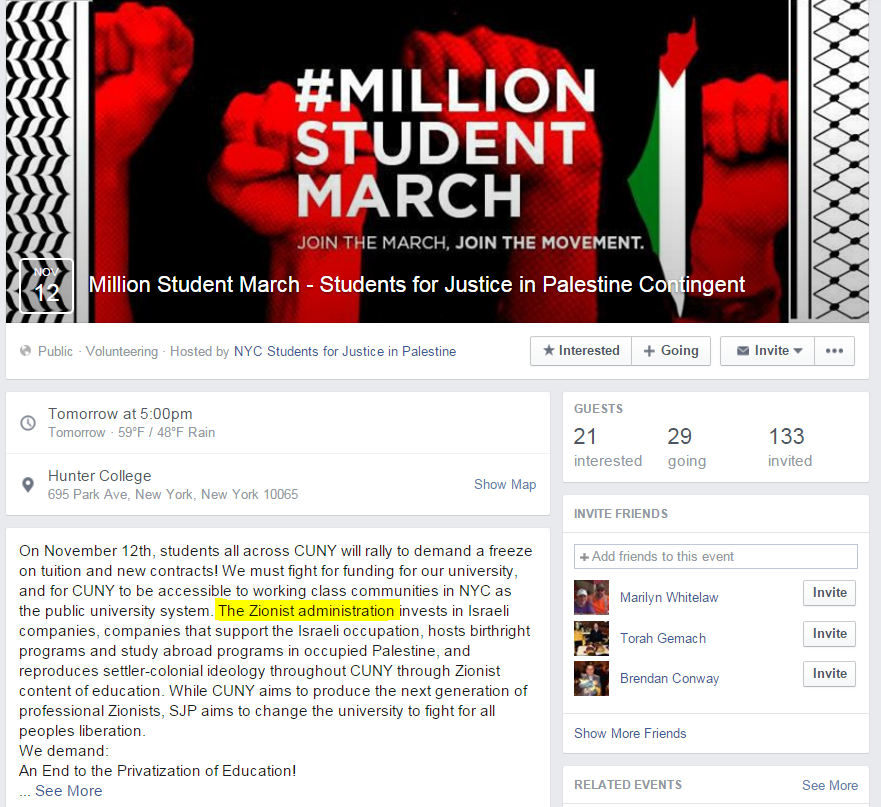
A similar attempt to link BDS to unrelated issues, building off of fossil fuel divestment was attempted by SJP at the University of Pennsylvania last year, this time calling for divesting from “Displacement”.
Are SJP activists confused? Deceptive? Do they simply not understand the notion of a non sequitur? Perhaps all of the above, but what is involved here is the new rage of “intersectionality”, the latest meme (or virus, your mileage may vary) to populate the minds of social justice warriors everywhere. SJP, for better or for worse, has ridden this wave very effectively, co-opting causes like “Black Lives Matter“, “Queer” Activism (obsessed with ‘Pink-Washing‘), campus rape, even physical disabilities.
As we wrote previously:
The trend for the BDS movement is to make demonization of Israel the center of the progressive universe through the theory of “intersectionality.”
Israel is placed at the center of all evil in the world, the unifying focus regardless of the issue:
“Every real or perceived problem is either blamed on or connected to Israel.
The concerted effort to turn the Black Lives Matter movement into an anti-Israel movement has at its core the claim that Israel is the root of problems of non-whites in the United States. Thus, if a police chief somewhere attended a one-week anti-terrorism seminar in Israel years ago, every act of brutality by a cop on the beat is blamed on Israel. So too, Students for Justice in Palestine protesters in New York City even blamed high tuition on Zionists, leading to rebukes by administrators against such thinly-veiled anti-Semitism.
The Jew once again is made the source of all evil, the conspiratorial puppet-master controlling all and responsible for all. And Israel alone receives such treatment and is used as the link to connect all injustices in the world.
Perhaps these folks need a lesson in the notion of logical strength: the more claims your statements make, the more ways it can go wrong (and the less likely it is to be true), but for now, perhaps a lesson in Venn Diagrams will do:
SJP at NYU followed the same tactic. In their campaign for divestment, they distributed materials making the case for three campaigns: (1) Divestment from ‘Occupied Palestine”; 2) Fossil fuels divestment; and (3) grievances (but no divestment, of course) relating to working conditions at NYU’s campus at Abu Dhabi. This was followed (in section 3 of the packet) by statements supporting each of the initiatives (sections 3.1, 3.2, and 3.3 respectively) and then in 3.4 “Academic Associations and Unions Supporting Divestment”.
Divestment from what? Well all of the materials from this point on referred exclusively to BDS, as if to say, all three initiatives were one and the same.
The divestment petition last year managed to get 135 NYU faculty signatures, although it is not entirely clear which petition the faculty actually signed. A key figure in the faculty initiative was Zachary Lockman of Middle East Studies, who has has mixed involvement with BDS issues in the past, both at NYU and at the Middle East Studies Association.
The statement currently on the website speaks of a targeted divestment from “Several multinational corporations” that have “profiteer[ed] from the occupation”. The list includes: Caterpillar, Veolia Environment, Motorolla Solutions, Hewlett Packard, G4S, Ebit Systems, and Northop Grunman. The petition claims that several churches have divested and repeats the discredited claim that TIAA-CREF did so as well.
Below the text of the petition there are separate signature tabs for faculty and for students. Yet if one clicks on “See verified signatures” a new document opens up, with only the faculty signatures, and without the original text. Whether the faculty signed this statement or the one that included mention of fossil fuels as well (did some of them think they were signing a statement about fossil fuels?) is unclear.
This becomes especially suspect when one looks at the campaign home page which has four separate petition links:
- The first is on the top of the home page and calls for (1) Transparency concerning NYU’s divestment portfolio; (2) Divestment from companies “that profit from the occupation of Palestine”; and (3) “Adopting a Human Rights” Screen: for future investments. When one clicks on the link to ‘sign the petition’, the link to sign leads back to the faculty petition, mentioned earlier, under a different url.
- Secondly, midway through the page, following a ‘letter from Palestinian Trade Unions‘, is an “open letter” signed by faculty. This is the very same divestment petition, again.
But then things get funny.
- The next tab is titled “NYU Students Call on the University to Divest” which allows “NYU Students” to sign. But what document are they signing? This document is nowhere to be found; presumably it is the same as the faculty one. Who knows?
- This is followed by “NYU Grad Students Urge their Union to Endorse BDS” which features a call to NYU’s graduate student union (GSOC-Local 2110) to hold a referendum to join BDS. This letter is signed by nearly 250 graduate students at NYU. This is not the same letter sent to the faculty. This letter, which involves the union, is far more belligerent and ups the ante considerably.
Unlike the faculty letter, which makes no mention of BDS, the graduate student letter, paraded on the very same website, speaks explicitly of “joining the Boycott Divestment, and Sanctions (BDS) movement”. Here is some more of the incendiary rhetoric that 250 of NYU’s finest young minds signed on to:
Since its creation, the State of Israel has brutally suppressed Palestinian demands for self-determination, and to this day it enforces an apartheid system, illegally privileging one ethnic group over another. In 1948, Zionist militias established a Jewish-only state and made 750,000 indigenous Palestinians refugees in the process…
This, to dispel any misconception that the concern with ‘occupied Palestine’ referred only to the West Bank and Gaza, rather than to (all of) Israel itself.
After repeating the usual boiler plate of BDS petitions everywhere, the letter ends with:
We therefore call on GSOC-UAW 2110 to hold a referendum on the issue of joining the global movement for Boycott, Divestment and Sanctions, until Israel complies with international law and respects the rights of Palestinians in the West Bank and Gaza Strip, Palestinian citizens of Israel, and all Palestinian refugees and exiles in two ways:
1. Calling on NYU and UAW International to divest their investments, including pension funds, from Israeli state institutions and international companies complicit in severe and ongoing human rights violations as part of the Israeli oppression of the Palestinian people.
2. Calling on NYU and the UAW International to decline to conduct business with said institutions and companies.
This now makes the campaign a union issue. In order to understand this campaign we need to delve into the background of NYU’s GSOC union and the union of graduate students at the University of California who put forth a boycott resolution of Israel in 2014.
We’ll note for now, something which we’ll return to later, even this graduate student petition (which differs from the faculty letter) is not the resolution actually being put forth by the union. That resolution is far more incendiary.
III. BDS at University of California UAW (a precursor and inspiration for the NYU effort)
A. BDS Referendum
In December 2014, anti-Israel activists who took over the Graduate Student Union of the University of California (UAW 2865) system passed a boycott resolution of Israel. While the resolution passed with a near 2 to 1 majority of those who voted, the number of those who actually voted was approximately 2,160 out of approximately 50,000 graduate students in the University of California system (i.e. approximately 3% of all graduate students voted for the resolution).
The resolution passed despite the opposition of UAW leadership and the California Teamsters. The Teamsters wrote that in calling for boycotting Israel:
…we cannot conceive of an action more hostile to the interests of our members [Teamsters] and more antithetical to the most basic principles of the labor movement than for a union to call for actions which are intended to harm the economic security of other union members.
B. Appeal
Opponents appealed the vote to UAW leadership, claiming the process was unfair:
Over the past several months, the Union leadership invested thousands of dollars, together with the Union’s institutional and human resources to promote a ‘yes’ vote.
“Opponents of BDS were denied equal opportunities to reach members. The views of opponents such as Informed Grads, their events and their written arguments were not published or publicized by the local union in anything other than a token manner, and comments by opponents were not considered in the drafting of union documents.” The Union wrote and disseminated thousands of words in favor of BDS. The Union refused to send members a single paragraph from the opposition.
“This election process did not even have the appearance of fairness,” added UCLA student Philippe Assouline. “The polls were often staffed by pro-BDS campaigners. One union member tried to have me forcibly evicted because I opposed BDS even though I was abiding by all the rules. Meanwhile pro-BDS campaigners were everywhere.”
C. Overruling of Referendum by UAW Leadership
In December 2015, UAW’s International Executive Board (IEB) granted the appeal and struck down the BDS resolution. Apparently, UAW struck down the resolution on substantive grounds (i.e. that the boycott was discriminatory and anti-semitic, and that it would harm other UAW members), rather than on procedural grounds of fairness as claimed in the appeal.
UAW 2865’s “BDS Caucus” issued a statement shortly thereafter in protest, accusing UAW of “business unionism”. Meanwhile, Salon’s staff writer and BDS advocate Ben Norton wrote a piece blaming the law firm Gibson, Dunn, & Crutcher, apparently attempting to discredit them, their case, and the UAW by mentioning other clients, whose constitutional right to counsel, the firm protected (much to the consternation of Mr. Norton).
With help of corporate law firm, small pro-Israel group derails historic UAW union vote endorsing boycott https://t.co/rZIiyxeIc5 via @Salon
— Ben Norton (@BenjaminNorton) January 25, 2016
Not to be outdone, “Labor for Palestine” issued a letter on January 28th, 2016 to the UAW Leadership to “respect union democracy, solidarity, and the BDS picket line” (apparently, solidarity with fellow trade unionists in Israel doesn’t count). The letter, quoting extensively from the previous two documents, continued Mr. Norton’s misunderstanding of what an attorney is, accusing UAW of “sid[ing] with anti-labor corporate lawyers to defend the profits of military contractors who arm apartheid Israel” and accused the UAW of a “longstanding and unaccountable complicity with the racist ideology of Labor Zionism”. The letter announced an intention to appeal to UAW’s Public Review Board.
The letter was followed by a long list of letters of support in solidarity, including the by now obligatory letter of ‘Jew-Washing’ by Jewish Voice for Peace (JVP), with an option to sign on “As Jews and allies”, as well as one from the President of the Israel-boycotting American Studies Association, David Roediger, who while insisting his outfit was an “academic association” addressed UAW President Dennis Williams, as “Brother Williams”, and spoke of the importance “broad progressive coalitions” (in the scholarly sense of ‘progressive’, one presumes, and obviously in the sense that means ‘broad’ without including Israeli progressives, but we digress…)
Closer to the heart of this piece, however, is the letter of Support from NYU’s GSOC-UAW Local. In a letter that clues us in as to where GSOC’s Assembly of Stewards stands on the issue, the letter opposes IEB’s nullification of the BDS resolution, out of respect for the “decision making power of local unions and bargaining units”. The letter states:
we believe that, in the interest of building a robust union reinforced by bottom-up activity, the International should have prioritized its internal democratic process over the concerns of these other parties. Moreover, we find it disingenuous of the IEB to claim that Local 2865 broke its constitutional obligation of working toward the “solidification” of the labor movement. We might point out that, in the case of divesting from South Africa, anti-apartheid activism unified and strengthened the American labor movement in the 1980s. At a time when the BDS demand is gaining traction on university campuses and more broadly among progressive forces in this country, why can’t the labor movement play a similar role? And at a time when the UAW is spending a great deal of its new organizing efforts on academic workers, many of whom care deeply about this issue, why shouldn’t our union catalyze that struggle? It will be recalled that UAW divestment from South Africa was prompted by rank-and-file initiative. The legacy of our labor movement may have been different had the International isolated those efforts in the way it is attempting to now.
IV. Background on NYU’s GSOC-UAW Local Union (ties to UC’s union and SJP)
In 2001, NYU’s graduate student/workers became the first to unionize at a private university. After a protracted dispute with the NYU administration and an ongoing dispute before the National Labor Relations Board, and culminating in vote among graduate student employees, the union was re-recognized as part of UAW in 2013 (the vote was 620 to 10, out of 25,000 or so graduate students).
A particularly activist caucus within the union called Academic Workers for A Democratic Union (AWDU) formed in the summer of 2014 and won a majority of seats on the bargaining committee.
This caucus, which won a contract with NYU in March of 2015, also spearheaded a great deal of the radical political activity, including BDS, on campus. In fact, AWDU is the “sister caucus” of UC-AWDU which leads the UAW at the University of California (see also here), in other words, the very same union caucus which ran UC’s BDS initiative. AWDU in California has been severely criticized on the left for its focus on “Social Justice” activism at the expense of concrete results, leading to diminished membership participation.
Prior to AWDU’s victory at NYU, the focus of the campaign was on transparency and better contracts (i.e. bread and butter issues). Shortly after winning the internal elections, AWDU members were proclaiming their intention to radicalize GSOC-UAW. Apparently, this was the pattern in California too. For instance in this piece in Jacobin, an NYU union member wrote:
At the forefront of this movement is Academic Workers for a Democratic Union, a reform caucus that has been organizing in the University of California system for the past four years. After sweeping the elections for Local 2865 executive board positions statewide, AWDU leaders then radically reoriented the bargaining process and staged a contract campaign that sought to prove that there didn’t need to be a trade-off between so-called “bread and butter issues” — compensation, healthcare costs, teaching conditions — and social justice issues, such as support for undocumented students, working mothers, and trans* and gender non-conforming people.
After the contract was signed, mention of ‘justice in Palestine’ and fossil fuel divestment popped up. AWDU members, in cooperation with SJP, have been central in putting together the upcoming NYU BDS referendum
In a piece on the UAW IEB’s nullification of the University of California BDS resolution, AWDU is referred to as “a new wave of graduate student workers who say they aim to reform the International in more progressive directions”. David Klassen, an NYU Grad Student, union leader, and AWDU member is quoted as being ‘excited’ about the California BDS campaign and that AWDU members have “learned from the effort in California and launched their own campaign at NYU”.
While AWDU does not consist of the entirety of GSOC-UAW 2110, its members are the dominant faction. Currently, according the GSOC website, at least 10 out of the 18 serving stewards are members of AWDU.
Seven out of the other eight don’t state what faction they belong to, and one steward seems vociferously opposed to this faction, reporting that AWDU resorts to the well worn Marxist tactics of accusing dissenters of “heresy” and the like (it’s noteworthy, albeit purely anecdotal, that the sole (nasty) comment at the bottom of the dissenting steward’s blog’s description is from someone monikered as ‘BDS in the Labor Movement”).
This doesn’t mean that all non-AWDU members oppose AWDU’s radical agenda. The dissenting steward/blogger, for example, still supports BDS. In fact, all but 5 of the 18 stewards (of which only one is an AWDU member) have signed either the petition to GSOC to put BDS on the ballot, or the open letter to UAW protesting the nullification of the UC BDS vote. Of these remaining 5, one has indicated in her biography that she was active in SJP at Cornell, which leaves at most 4 of 18 stewards who have not publicly expressed support for BDS.
V. NYU GSOC’s BDS Petition (the current referendum)
A. Process
(1) Political Solidarity Committee
The BDS drive was initiated by the “Political Solidarity Committee”. From meeting minutes, it appears that a BDS campaign has been a priority since at least July of 2015. In October of 2015, the GSOC petition letter was circulated.
Involvement of Maya Wind
The first signature, and apparent co-organizer is Maya Wind. Ms. Wind has become a ‘celebrity’ in BDS circles. She is an Israeli who refused to be drafted into the army (and served a 40 day prison term). While attending Columbia, Ms. Wind became known for anti-Israel activity, including mock displays of Israeli soldiers needlessly humiliating Palestinians at checkpoints.
Ms. Wind studies at NYU’s department of “Social and Cultural Analysis”, which houses (what else?) American Studies, among other fields, and is home to Lisa Duggan (Past President of the American Studies Association, BDS activist, and organizer of secret BDS conferences). Naturally, Wind is a PhD student in American Studies. In case one might suspect that some in American Studies confuse their activism for scholarship, Ms. Wind makes her focus clear. Here, for instance is her scholarship profile on the graduate student page:
Maya Wind is a feminist activist from Jerusalem. In 2008 she helped establish the Shministim Letter of young Israeli conscientious objectors. For her refusal to serve in the Israeli army she was sentenced to military prison and detention. After her release she co-led the Jerusalem alternative education program of New Profile, the feminist movement for the demilitarization of Israeli society. She also guided political tours in East Jerusalem and the West Bank for the Israeli Committee Against House Demolitions, and worked against Palestinian displacement and Israeli colonial expansion in East Jerusalem. Today she is a board member of ICAHD-USA and an active member of Anarchists Against the Wall and Boycott from Within, the Israeli contingent of the BDS movement
TONIGHT (12/1) | Please join us for BDS: The US, Israel & the Struggle for Palestinian Rights w/ @jvpliveNYC @NYUSJP pic.twitter.com/E3IFbshI5P
— NYU SCA (@SCAatNYU) December 1, 2014
Meanwhile, at the GSOC Union…
At the October monthly “Assembly of Stewards” meeting, it was announced that the BDS campaign had begun. In November, an event titled “UAW: Time to Stand Up to Israeli Apartheid” was held. Ultimately the BDS organizers formed the GSOC for BDS Caucus.
(2) Signature Gathering
According to the union’s By Laws, a petition can be sent as a referendum to the general membership if either:
- it has the signature of at least one tenth of the membership or
- support of two thirds of active stewards.
At the moment, as at least 13 of 18 stewards have signed the letter (there are slots for 30 stewards, according to the GSOC by laws, but it appears that only 18 are presently manned), it appears, that they have sufficient signatories to proceed.
Given AWDU’s affinity for bottom-up ‘democratic’ governance, however, their preference is to attain a referendum via signature of 10% of the membership. Given their 250 signatures on the petition, it appears that they’ve met this threshold.
(3) Submitting the petition to the next meeting (April 5th) – Vote on April 18-22
It is our understanding from our sources that the intention is to submit the signatures at the next Assembly of Stewards meeting (on April 5). If this goes as expected, the actual vote will transpire during GSOC elections, scheduled for April 18-22.
B. Campaigns
(1) Town Hall Meetings
Two town hall discussions were set. One transpired on March 9 the next will be on March 30th. (If you or someone you know is at NYU, please consider attending the next townhall on March 30th!)
(2) Who Can Vote?
In order for the referendum to pass it needs a majority of votes. Only voting members of the union can vote. Herein lies the rub. While the Union terms cover all graduate workers at the relevant NYU schools (see more about this below), only paying members can vote. Since the union contract protects non-paying, as well as paying, members equally, there is little incentive to become a paid member.
This creates a dilemma for those who don’t support GSOC’s agenda: the only way to prevent GSOC from endorsing BDS is to vote against the resolution by becoming a paid member (2% of compensation: not a simple proposition for graduate students on a stipend in New York City!). It also means contributing financially to the very union whose activity one disapproves of. This mechanism ensures that only the most radical voices are heard in these elections.
GSOC minutes suggest that membership (which fluctuates from term to term) is currently at somewhere between 500 and 1100 (GSOC itself is unsure; this piece inflates it to 1200) out of nearly 25,000 graduate students covered by the union contract at NYU.
In other words, even if every member of the union were to actually vote in this referendum (a highly dubious proposition!), GSOC could endorse BDS by obtaining approximately 250 votes (or 601), out of 25,000, i.e. with only 1% (or 2.4%) of the student body! A similar concern arose in the University of California system, one which has arisen even by some of the more candid BDS supporters.
But what is most incredible perhaps, is the actual resolution being forwarded. While the first letter, the faculty letter, spoke of targeting multinational corporations, and while the second letter, which was much more incendiary, calling Israel an apartheid state, still “only” called for divestment from companies that ‘profit’ from the occupation, the actual resolution that is planned to be put on the ballot elevates this to a whole new ballgame!
(c) The proposed Resolution
This resolution contains two parts/questions:
The first, following the typical boilerplate about BDS makes three actual calls of NYU and UAW. The first two are familiar from the previous letters:
- Calling on NYU and UAW international to divest their investments, including pension funds, from Israeli state institutions and international companies complicit in the ongoing violation of Palestinian human and civil rights.
- Calling on NYU and UAW international to decline to conduct business with said institutions and companies in the future.
But the third adds a new dimension, escalating to an academic boycott, something that was never mentioned in the previous campaigns and which denotes a new level of extremism:
- Calling on NYU to close its program in Tel Aviv University, which continues to violate the NYU Non-Discrimination policy.
And what is this violation of NYU Non-Discrimination policy? No explanation is given, but a link is provided to NYU’s general policy.
Remarkably, not only is the rationale (non-discrimination) not explained, but NYU had a campaign concerned with discrimination at its other campuses (Abu Dhabi in particular, as mentioned in the very packet distributed in support of the resolution in the first place). The Abu Dhabi campus was called out (see also: here) by many of the same figures involved in this campaign for fair labor practices, for violations of academic freedom. Yet, of course, there is no call to shut down NYU Abu Dhabi.
Similarly, for NYU Shanghai.
Turkey too has been the target of multiple academic petitions this year, for violation of academic freedom. In fact, NYU GSOC released a statement in solidarity with Turkish academics, who have faced “detention and state repression” (emphasis added) yet no call has been placed to boycott Turkey or to shut down NYU’s study abroad programs in Turkey. Similarly for India. Same with South Africa.
Amazingly, it is only Israel whose actions warrant a boycott. It is only Tel Aviv University whose program is to be shut down, i.e. discriminated against, in the name of ‘discrimination policies’. Orwell would be proud!
If the first proposal on the ballot were not enough, GSOC allows its members to rise to a more sanctimonious level of purity in giving:
… members the opportunity to make a voluntary and non-binding individual commitment to participate in the academic boycott, which targets Israeli government and academic institutions complicit in Israeli violation of Palestinian rights:
I will personally adhere to the academic boycott, by refusing to take part in any research, conferences, events, exchange programs, publications or other activities that are sponsored by or require official affiliation with the Israeli government or Israeli academic institutions. In accordance with BDS guidelines, this academic boycott does not target individuals of any background, but only institutions complicit in the violation of Palestinian rights
In case one is concerned that this discriminates against Israeli institutions, one’s conscience is mollified by the following heartwarming footnote:
This resolution opposes all forms of discrimination on grounds of race, religion, national origin, ethnicity, gender and sexual orientation and identity, and is unequivocally committed to the principles of academic freedom for all members of the NYU community.
Of course, calling it so doesn’t quite make it so.
VI. The Opposition
Meanwhile, a small group of NYU Graduate Students have organized a counter petition (also available here). They have faced some difficulty mobilizing support.
Part of the explanation lies in the difficulty in getting graduate students interested in joining the union in the first place. Only the most committed to fighting BDS would consider taking the time, effort, and pay-cut, to vote. Additionally, as is the case elsewhere, actively opposing BDS in the contemporary academy is not always advisable for aspiring academics.
In the meantime, a Facebook page is up, and there are some well written and researched materials on the website. Here, for example, is an annotated “assessment” of the BDS resolution itself. It correctly points out the willfully vague language of BDS (“occupation” – does it mean 1948 or 1967?; “dismantle the wall” – what about the reasons for the wall?; the maddening vagueness of claims like ‘complicit’ and how they are disguises for blanket boycotts) and points out both the hypocritical language of the non-discrimination claim “for all members”: except, as is pointed out, “for those who affiliate with Israeli institutions”.
Two well written essays, one on BDS’s straw man rhetoric, the other on BDS’ blanket boycotts (which in effect allow an opt out of BDS via political litmus test), are available on the website as well.
It is to be hoped that NYU students considering voting for BDS will read these essays first (if you know any, please point them that way!).
Whether they will, of course, or whether the activists and other union members will be persuaded, remains to be seen.
VII. Conclusion: What’s the Point?
It’s worth remembering that as things stand, UAW annulled the University of California boycott resolution. It stands to reason that they’d do the same here should NYU students vote that way.
So what gives? Does GSOC really intend on a boycott or is this just an empty gesture aimed at getting their resolution annulled by the UAW leadership as a symbolic gesture of victimization?
In other words, just another AWDU style tactic which sacrifices the interests of its constituents for the sake of 15 minutes of fame in the celebrity limelight. SJP, in the meantime, would be able to claim credit for hijaking yet another organization, driving it over the cliff.
[Featured Image – NYU SJP Protest 2014, via NYU-SJP Facebook]
More importantly a win for BDS here would be enormously symbolic and would add to the momentum of the feverish BDS activity taking place this academic year. We’ve already written about the uptick in boycott and BDS activity in various academic associations. The National Women’s Studies Association (NWSA) voted for boycott and a boycott referendum is about to be placed before the membership of the American Anthroplogical Association (AAA), after an overwhelming vote in favor at the association’s meeting in Denver. There is talk of putting a boycott vote before the Modern Language Association (MLA) next January and as well as before the Middle East Studies Association meeting. (Meanwhile, BDS has been set back with at the International Studies Association and at the American Historical Association).
In New York City itself, there is an active BDS campaign at Columbia, and so much SJP activity around the CUNY system, that has turned so vitriolic, that CUNY has launched a probe into whether they have an anti-semitism problem. A boycott resolution at CUNY Graduate Center was defeated in October 2014, but is rumored to be surfacing again soon.
These actions should not be viewed in isolation. The expected passage of BDS at the AAA around the same time as the NYU campaign (mid-April) will create the impression of a tide of support in favor of boycott and will ease the pressure on other campuses and associations to follow suit. Academic boycotts, which have up till now been viewed as beyond the pale might graduate from being the chosen tactic of only the most marginal and radical politicized academic organizations to become something acceptable and sufficiently mainstream.
This would be especially true coming out of the three main university systems in New York City of all places, the city with the largest Jewish population in the United States and whose three largest research university systems (Columbia, CUNY, and NYU) have pride of place in the life of the American Jewish community.
———————-
The author is a graduate student who must write under a pseudonym for fear of retribution from pro-BDS faculty.
Donations tax deductible
to the full extent allowed by law.


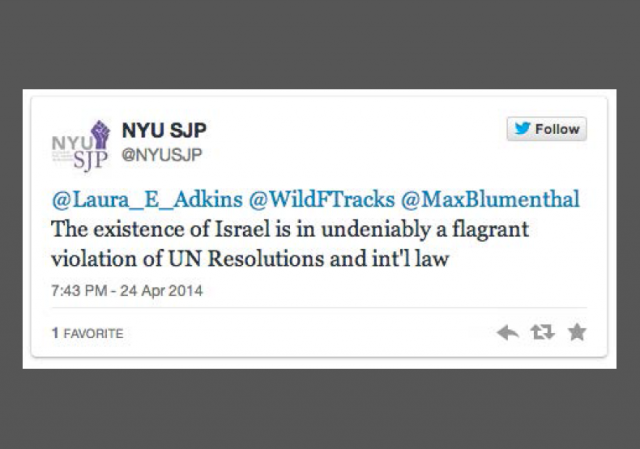
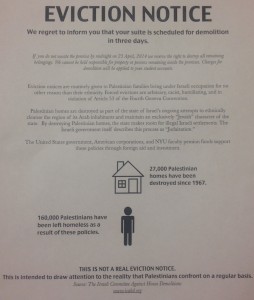
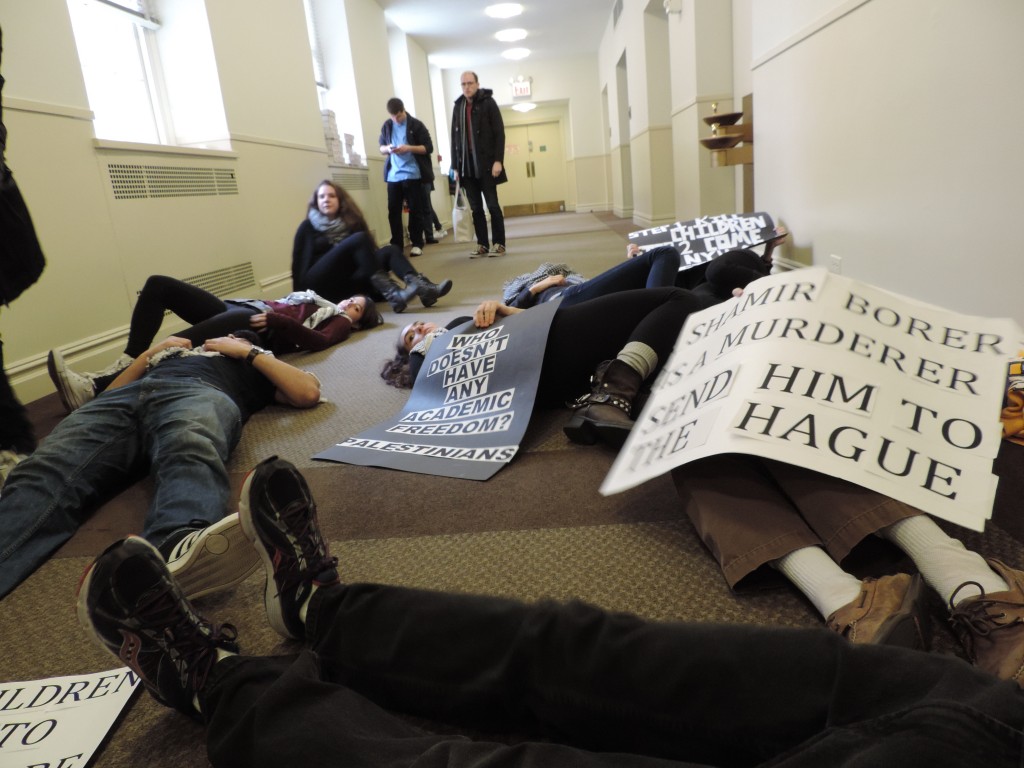
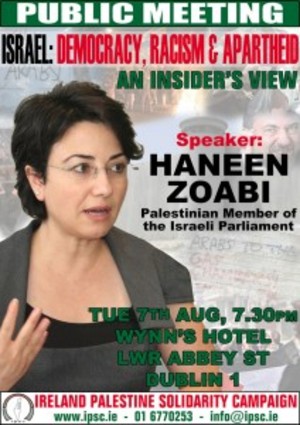
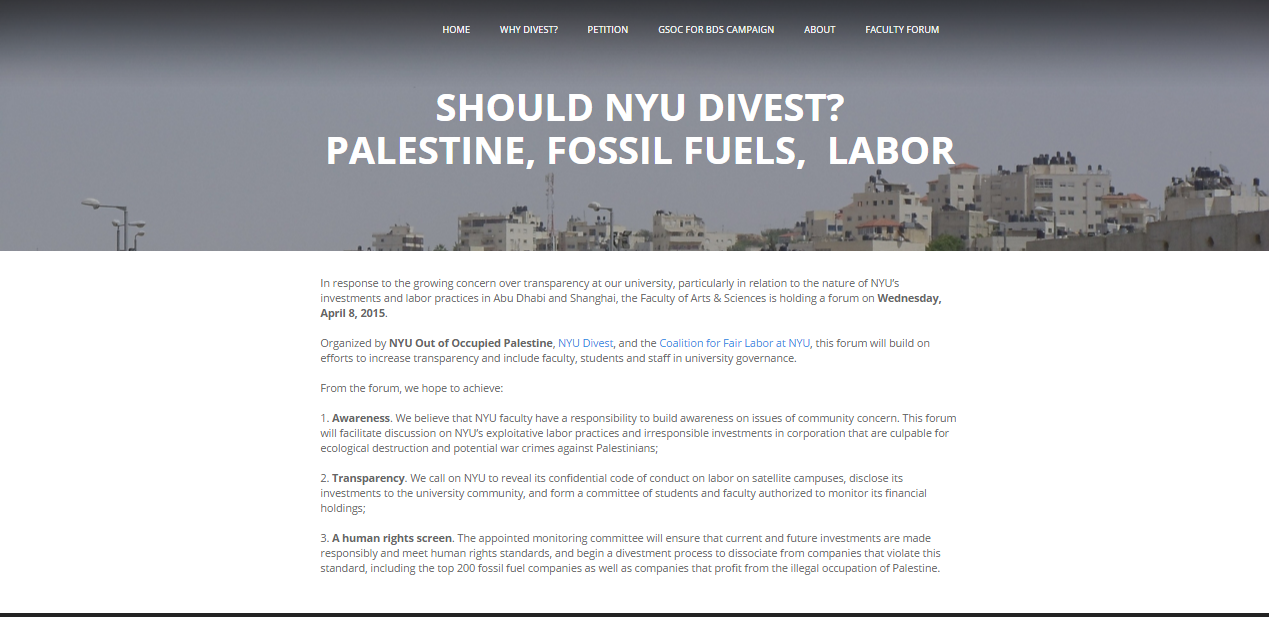
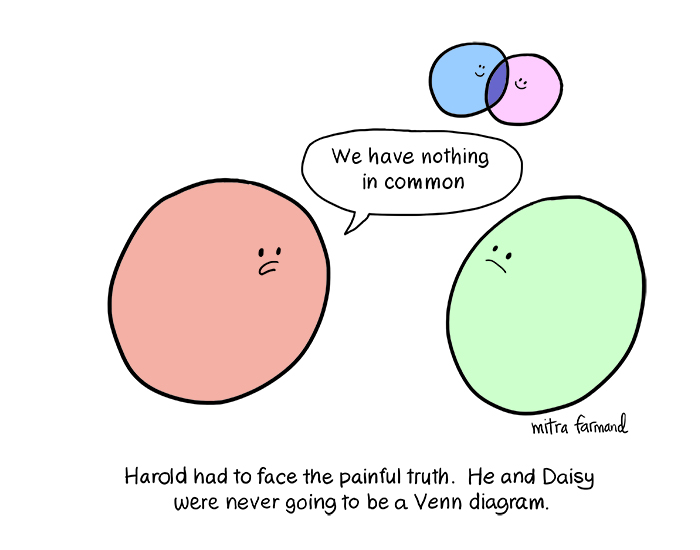
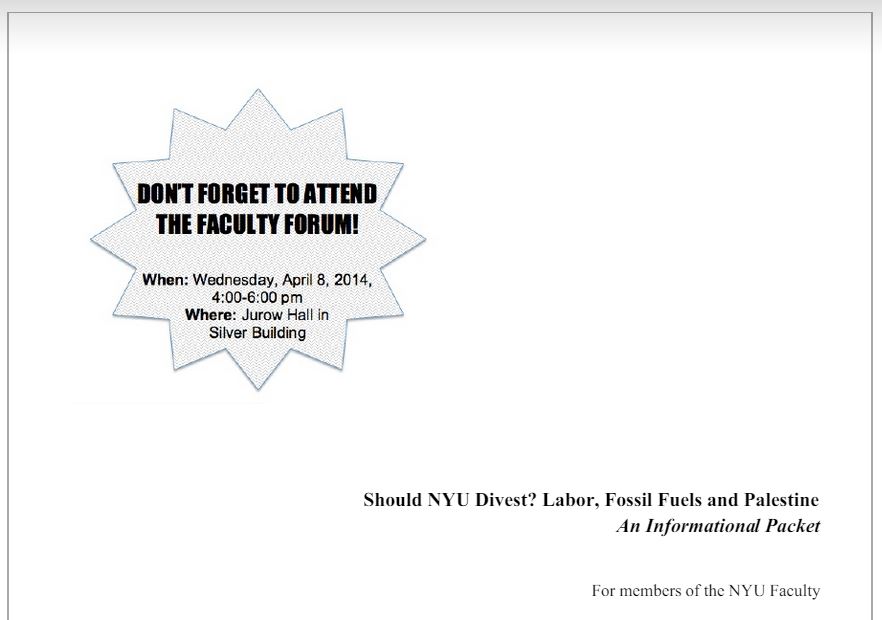

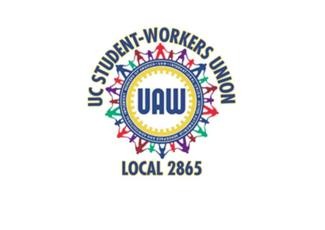
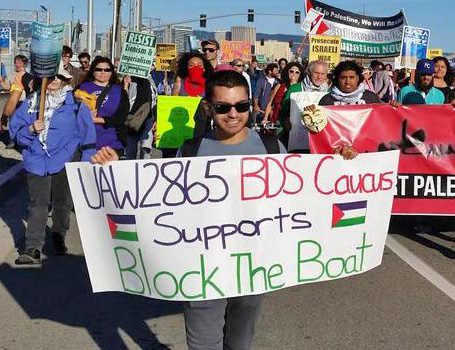
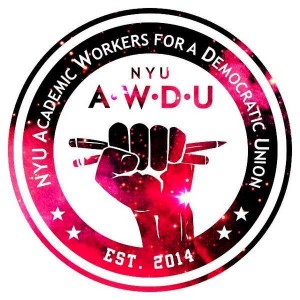
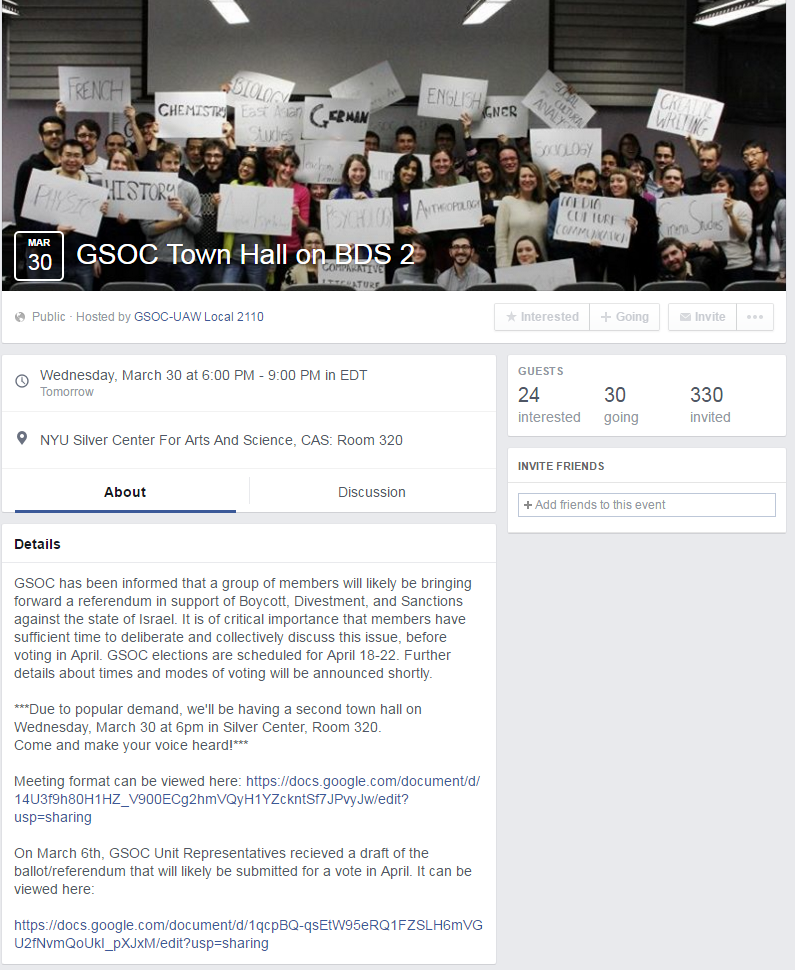
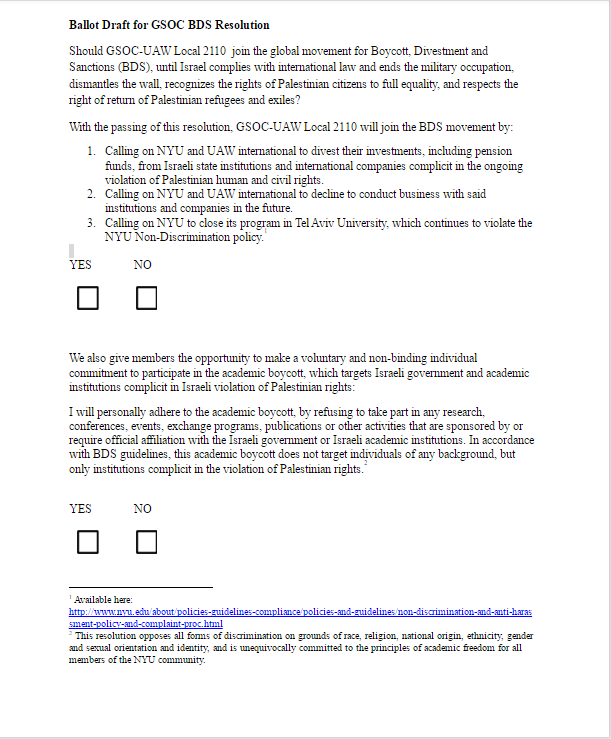
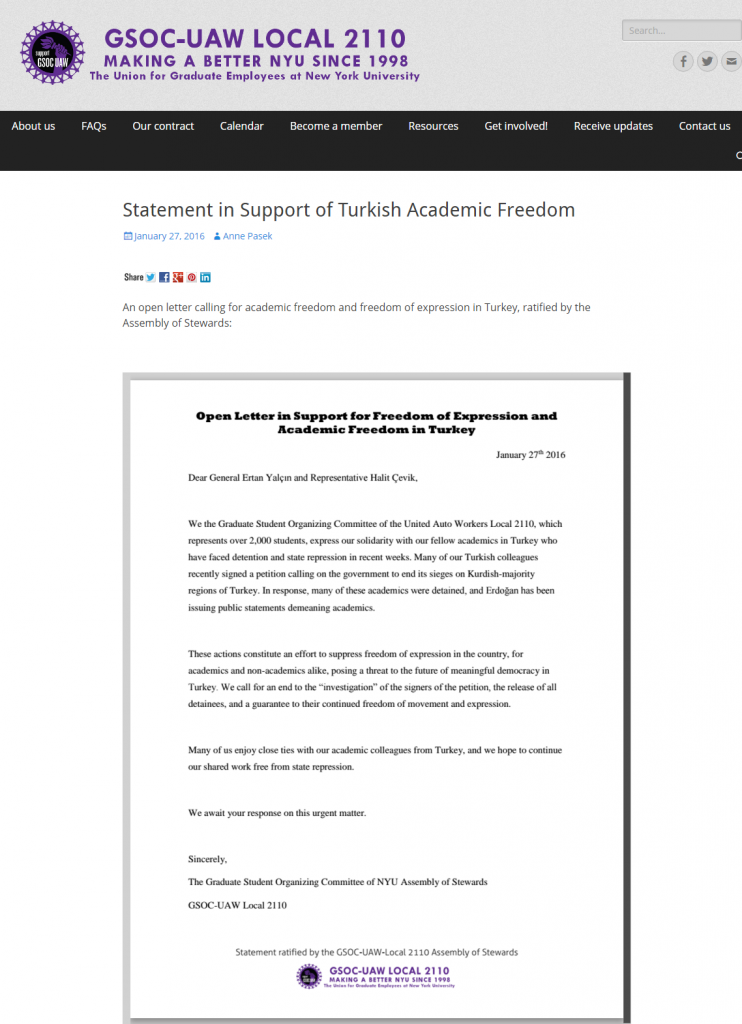
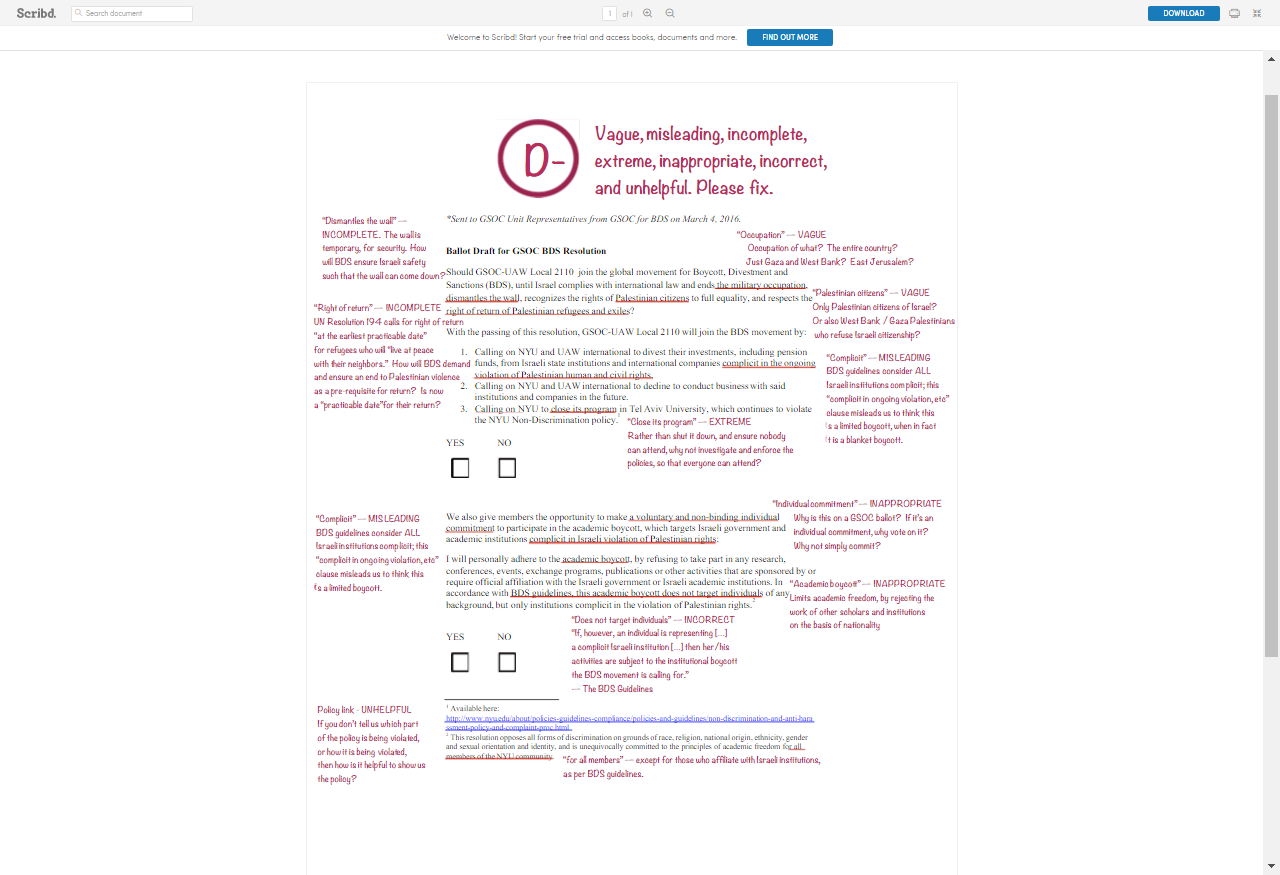







Comments
Imagine if these a-holes spent this kind of energy on studies, instead of useful-idiot activities? — A cancer cure within one year, and an anti-gravity machine within two.
Superb report and documentation. This goes into the archives.
I would like the grad student who wrote this to come forward and stand with the people who are openly resisting the BDS loonies. You have more friends than you know.
And yes, that’s my real name signing this comment.
I am the dissident steward and critic of AWDU cited in the piece. As indicated I do support BDS although I am critical of AWDU’s record of ineffectiveness in collective bargaining and failure to gain significant membership support for our union’s demands during the calendar year since GSOC settled our contract. I am writing with a couple of clarifications to misleading statements in this piece. It is appropriate to state that the total turnout in the BDS vote at UC AWDU was a tiny minority (about 5%) of those eligible to vote. This is because, as I understand it, under UAW Local 2865’s Bylaws all graduate students are eligible to vote whether or not they hold a position under the contract. It is not appropriate to make this implication about the December 2013 yes/no vote on having a union for graduate student workers at NYU because only graduate students working under the contract at that time were eligible to vote in that election. There were about 1200 such graduate students during that semester, meaning that the 630 who voted “yes” represented a clear majority of all those eligible to vote. For the BDS vote, it is untrue that only “paying members” are eligible to vote. Under the membership definition in GSOC’s Bylaws, which I oppose, any graduate student who is “eligible” to work in a bargaining unit position can sign a card and have voting rights whether or not the person is working under the contract. Graduate students not working under the contract do not pay dues whether they sign membership cards or not. Moreover, it is possible to sign a union membership card without signing up for dues check-off, in which dues are automatically deducted from the paycheck. On the other hand, the payment of dues or an equivalent fee for those who are working under the contract is not optional but is instead a term and condition of employment. Thus there is no calculus concerning whether or not to pay dues in order to be able to vote in the BDS referendum: one is required to pay dues, or not, based on one’s employment status, and one may vote, or not, based on one’s decision to sign a membership card. (Those working under the contract who decide not to become members are still required to pay to the union an agency fee equivalent to union dues. These are the terms of our contract and the norm outside “right-to-work” states, which New York thankfully is not yet.) In my view, this all means that all graduate students at NYU except those specifically excluded from holding positions under the contract should be able to sign a membership card and vote. The only graduate students specifically excluded under the contract are MBA candidates at the Stern School of Business, so my position would be that under our current Bylaws any graduate student other than an MBA candidate at the Stern School of Business should be able to sign a membership card and vote in the BDS referendum. The NYU AWDU majority has made it clear to me that they do not accept this position and also believe that law students and medical students should be excluded from the vote, but I am unsure exactly why.
What clueless morons those anti-Israel students are. None have a grasp of history or the politics of that area. What they do have is the ability to soak up propaganda and foment outrage. Why is this up for a vote? Students are a transient population. They don’t run, rule or own NYU. Further, the palestinians had countries. Those territories were part of Eqypt and Jordan.